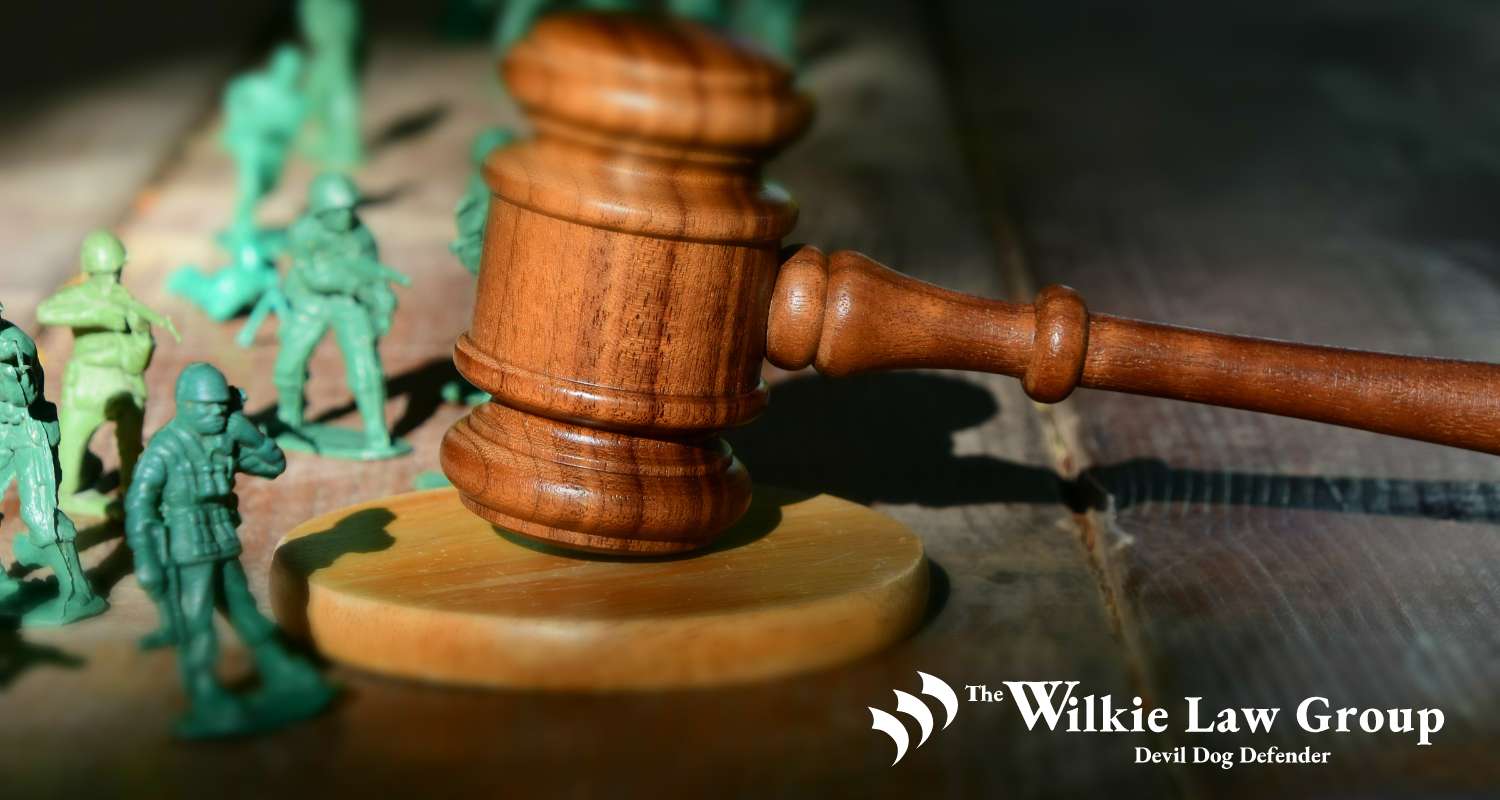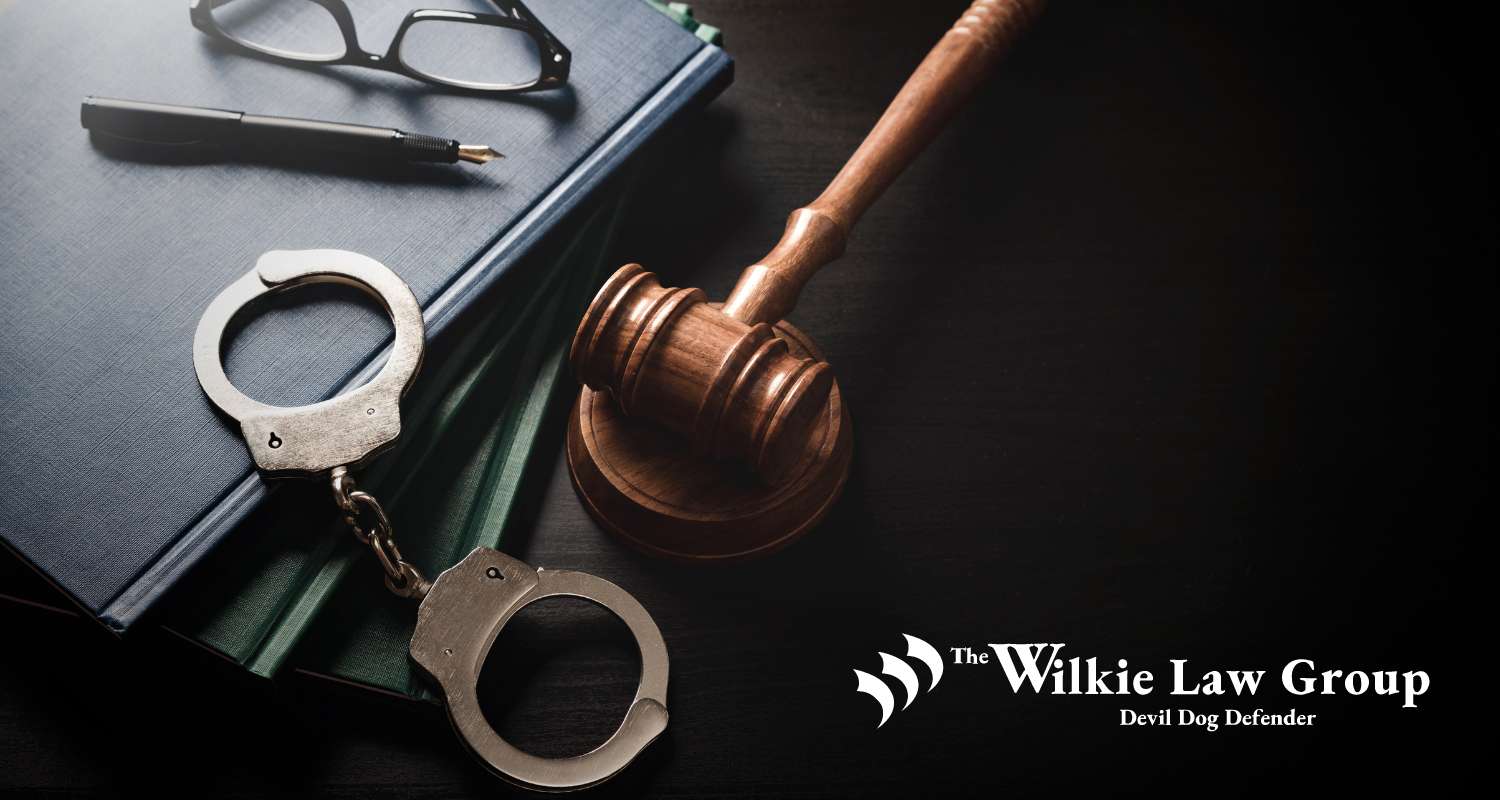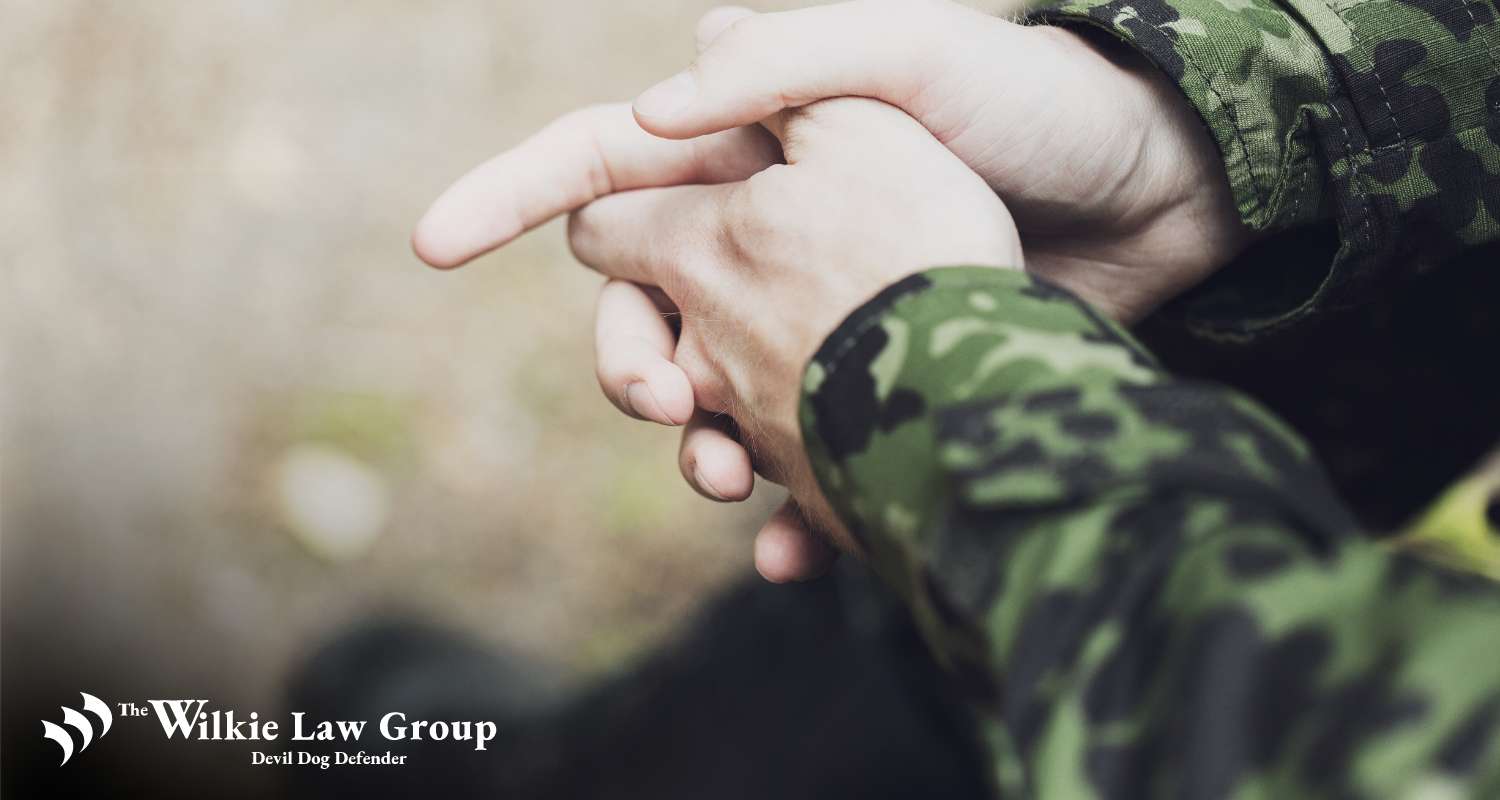Court-Martial Lawyer
Defense for Court Martial Hearings
Home » Military Defense Lawyer » Court Martial Lawyer
Military Counsel
Experienced Military Court Martial Defense Lawyer in Jacksonville, North Carolina
Being accused of a crime in general can be scary for anyone, but to be accused of a crime in the military can be even more so, especially when it results in being summoned for a court martial. Whether you’re in the Marine Corps, Coast Guard, Air Force, Navy, or Army and you’re facing criminal charges, you need the help of a qualified court martial lawyer to defend your rights, freedom, future, and military career.

At The Wilkie Law Group, we know that facing a court martial trial can be daunting. There is a lot at stake here, but our North Carolina military defense lawyers are ready to do whatever it takes to make sure you achieve the best possible outcome in your case.
If you’ve been notified that you are pending a court-martial, contact an experienced military defense attorney at The Wilkie Law Group by calling (855) 691-3396 for a consultation as soon as possible. Though we are located in Jacksonville, North Carolina, our firm represents clients across the entire state as well as any military installation located in the U.S., but travel fees will apply.
In cases like this time is typically not on your side, so do not wait to consult with a qualified counsel. Call Aden Wilkie at The Wilkie Law Group today to get straight to work on your court martial defense.
What is a Court Martial?
While most people are familiar with the civilian justice system, military law operates under a distinct and complex set of rules, procedures, and penalties designed specifically for service members. For starters, a criminal trial in the military is referred to as a court-martial, and it functions differently from civilian trials in federal court or state court.
Each branch of the military uses court-martial proceedings to address criminal activity by service members, whether it involves minor infractions or serious offenses. Despite some variations between branches, all are governed by the Uniform Code of Military Justice (UCMJ), which sets the legal framework for military justice, and follows the same Rules for Court-Martial and Military Rules of Evidence and Punitive Articles.
Commanding officers play a significant role in the military justice process, with the authority to initiate charges and refer cases to court martial. The proceedings are presided over by military judges and involve military prosecutors and defense counsel. Depending on the severity of the charges, the accused service member may face a range of penalties, including dishonorable discharge, imprisonment, or even the death penalty.
Given the unique challenges and high stakes involved in military court, it is crucial for service members facing court-martial to have experienced legal representation familiar with the nuances of the military justice system.

What are the 3 Types of Court Martial?
There are three types of court-martial proceedings: Summary Court Martial (SCM), Special Court Martial (SPCM), and General Court Martial (GCM). The court-martial you face will depend on the nature of your charges. We’ll cover each of these courts martial in detail below.
What is a Summary Court Martial?
A Summary Court Martial (SCM) is the lowest-level court martial in the military justice system. The SCM is typically used to handle relatively minor offenses where the alleged misconduct is too serious for nonjudicial punishment, but not considered severe enough for a special or general court-martial. These offenses might include things like failure to report/AWOL (UCMJ Art. 86), disrespect toward a superior officer (UCMJ Art. 89), and failure to obey an order or regulation (UCMJ Art. 92).
SCM is composed of one officer who acts as judge, prosecutor, and defense counsel; he or she is charged with impartially inquiring into both sides of the matter and ensuring that the interests of both the Government and the accused service member are protected and that justice is upheld. In addition, service members must represent themselves in these cases. They do, however, have certain rights available to them, including the right to call witnesses, cross-examine witnesses, produce evidence, remain silent, and raise motions.
It’s important to note that service members do not have to accept a trial by SCM. However, the command does have the option to convene an SPCM or GCM if the Summary Court-Martial is declined. The decision to accept or decline an SCM should not be made before first consulting with qualified legal counsel.
Summary Court-Martial Punishments
If the accused is an E-5 or above:
- Reduction of one pay grade
- Forfeiture of two-thirds pay for one month
- Restriction for sixty days
If the accused is an E-4 or below:
- Reduction to E-1
- Forfeiture of two-thirds pay for one month
- Confinement for thirty days or hard labor without confinement for forty-five days or restriction for sixty days
What is a Special Court Martial?
A Special Court Martial, or SPCM, is the intermediate level of court martial in the military; it is less severe than a general court-martial but more serious than a Summary Court-Martial (think of it like a civilian misdemeanor court). However, while the proceedings are generally similar to those in civilian criminal courts, including a judge, defense counsel, and prosecution, the punishments are specifically tailored to the military context.
Offenses that may warrant an SPCM include assault (UCMJ Art. 128), larceny (UCMJ Art. 121), desertion (UCMJ Art. 85), willful disobedience (UCMJ Art. 90), and conduct unbecoming an officer (UCMJ Art. 133).
Maximum Punishment for Special Court-Martial
- Reduction in grade to E-1
- Forfeiture of two-thirds pay per month for a period of twelve months
- Confinement for a period of twelve months
- Bad conduct discharge
- Fines
As of January 2019, commanding officers have an additional tool in their legal kit: the “short-martial.” This is basically a SPCM held for less severe charges, but unlike SPCM, the maximum sentence that can be imposed by the judge is six months of confinement and no bad conduct discharge may be awarded. You also may not have a jury at a short-martial, nor may you refuse the forum.
What is a General Court Martial?
A General Court Martial (GCM) is the highest level of military trial and is reserved for the most serious offenses under the Uniform Code of Military Justice. These trials are comparable to felony trials in the civilian world and involve a full judicial process, including a military judge, defense counsel, prosecution, and often a panel of officers or enlisted members acting as a jury (unless the service member elects trial by military judge alone).
Common offenses that may warrant a GCM trial include murder or manslaughter (UCMJ Art. 118 and 119), rape or sexual assault (UCMJ Art. 120), mutiny or sedition (UCMJ Art. 94), and a number of other serious and violent crimes.
Maximum Punishment for General Court Martial
- Reduction to the grade of E-1 (officers cannot be reduced)
- Forfeiture of all pay and allowances
- Confinement for life without eligibility for parole
- Dishonorable discharge (dismissal for officers)
- Death (if capital offense)
- Fine for an unlimited amount
Of course, the maximum imposable punishment in any given trial for GCM is determined by the charged offense. Only the most serious offenses may result in the death penalty, and many provide for a confinement cap well below life.

Your Rights in a Court Martial
If your case proceeds to trial, it’s important to understand your rights. Your rights during a court-martial include the ability to:
- Be represented by military (no cost) and civilian defense counsel (member’s expense);
- Raise motions regarding points of law in dispute;
- Be tried by court members (jury) or a military judge alone;
- Invoke the Military Rules of Evidence regarding admissibility of evidence;
- Rely on the Government’s burden to establish the charged offenses by legal and competent evidence beyond a reasonable doubt;
- Remain silent;
- Testify;
- Request the production of relevant witnesses and evidence;
- Have access to information available to the Government counsel through the “Discovery” process; and
- Present matters in extenuation and mitigation.
While all these rights are important and are exercised most effectively with the assistance of a seasoned military defense lawyer, some bear further explanation. We’ll go into broader detail below.
Court Martial Right to Counsel
The right to counsel is the foundation for effectively exercising all other rights available to military personnel in a court-martial. If you’re facing charges, you’re entitled to free military defense counsel. However, it’s important to ask your assigned lawyer about their experience with cases like yours, as different services assign defense counsel based on their own criteria, which might not always benefit you.
You also have the right to hire your own civilian lawyer. If you do, you may choose to keep your military-appointed counsel on the case or be represented solely by your private court martial defense attorney. If you do decide to hire a private military defense attorney, it’s equally important that you inquire about their legal expertise, including their knowledge of military law, prior military service, and how much time they can dedicate to your case.
Right to Confront Witnesses in Court Martial Hearings
The right to confront witnesses (in other words, the ability to cross-examine them) involves much more than just asking questions on the spot. Effective cross-examination requires thorough preparation and careful consideration of how each witness fits into your overall case strategy. This often means interviewing opposing witnesses before the trial, sometimes more than once.
Right to Select Forum
In a court-martial, the accused retains the right to select forum, which means they can choose to be tried either by a military judge alone or by a panel of court members. If tried by a judge alone, the judge decides both guilt and sentencing if there’s a conviction. If the accused chooses a trial by court members, and they are enlisted, they can request that at least one-third of the court martial panel be enlisted members, though these members won’t be from the accused’s unit or be junior in rank.
Court members vote by secret ballot to determine guilt and, if there’s a conviction, to decide the sentence. Members are generally only excused if they can’t be fair and impartial, but each side can remove one member without giving a reason. This decision requires careful consideration of the members’ backgrounds, as certain factors, like gender, may influence the case differently than expected. This is often true with sexual assault cases.
Right to Testify in Court Martial Hearings
The right to testify is much more than an accused’s right to sit before the jury and tell his or her side of the story. Whether or not to testify is a decision made by the accused with the advice of his or her military defense lawyer.
An accused will never be in a position to make such a decision until he or she is fully prepared for the prospect of testifying. Only then can the accused’s military defense lawyer make an informed recommendation about whether or not to testify. This part of trial preparation, like all others, requires significant experience.

How Does Court Martial Work?
The court-martial process typically begins after a law enforcement or command-directed investigation is completed. The investigation report is given to the service member’s chain of command, where the commander, with advice from the Staff Judge Advocate (SJA) and legal office, decides how to proceed. Aside from court-martial, options include nonjudicial punishment (aka Article 15, Captain’s Mast, or Office Hours), administrative discharge, other lower-level adverse administrative actions, or no action at all.
If the commander decides that a court-martial is necessary, they will “prefer” charges, officially notifying the service member, now called “the accused,” that the court-martial process has started. If the case is set for a Special Court-Martial, it can proceed quickly, depending on docket availability and preparation time. In any case, it’s crucial to involve qualified legal counsel as early as possible.
A court-martial is “convened” when a senior officer, known as the Convening Authority (CA), orders the trial and appoints court members from their command. In some cases, members from outside the command may be included. Service practices vary; some appoint new members for each trial, while others have a standing panel for a set period, like six months. Once the CA refers the charges to a court-martial, the trial can begin after a minimum three-day waiting period, though it often takes longer. The military judge will coordinate with the counsel to schedule the trial date.
The Article 32 Hearing
If the commander decides to proceed with a General Court-Martial, the process differs significantly from that of a Special Court-Martial. While the preferral of charges remains the same, a GCM cannot move forward without first holding a preliminary investigation under Article 32 of the Uniform Code of Military Justice. This Article 32 hearing serves to protect service members from baseless charges and is somewhat similar to a grand jury hearing.
An Article 32 investigation is conducted by an impartial Investigating Officer (IO) appointed by the Convening Authority (CA). The IO can be either a Judge Advocate (JAG) or a non-JAG officer, depending on service practices. The IO’s role is to determine whether there are reasonable grounds to believe the offense occurred and the accused committed it, whether the charges are properly formulated, and what the appropriate forum for the case should be.
After the Article 32 investigation, the IO makes recommendations to the CA, who is not obligated to follow them but may do so in whole or in part. The CA can then decide to refer the case to trial by GCM, dismiss it, or opt for a lower-level disposition. However, most cases that go through an Article 32 hearing do tend to proceed to GCM. Once the CA refers the charges to a General Court Martial, the accused can be tried after a five-day waiting period, although the trial often takes longer to commence. As with an SPCM, the military judge will coordinate with the counsel to set the trial date.
While the Article 32 hearing has evolved over the years and is no longer the extensive fact-finding process it once was, it still provides an opportunity for experienced counsel to influence the case and set the stage for future legal arguments.
Article 32 Rights
Your rights under Article 32 include the right to:
- Be informed of the charges under investigation;
- Be informed of the identity of the accuser;
- With very limited exceptions, be present throughout the taking of evidence;
- Be represented by counsel;
- Be informed of the witnesses and other evidence;
- Be informed of the purpose of the investigation;
- Be informed of the right against self-incrimination;
- Cross-examine witnesses who testify;
- Have witnesses produced if their appearance meets the applicable requirements;
- Have evidence within military control produced if certain requirements are met;
- Present anything in defense, extenuation, and mitigation; and
- Make a statement in any form.

Court Martial Trial Procedure
The trial begins with a session without the court members present, where the military judge asks the accused about their choices regarding various rights, including representation and whether they want a trial by court members or by the judge alone. During this session, lawyers may also request rulings on legal issues, such as suppressing evidence or statements due to rights violations.
After these motions are addressed, the accused enters their plea. If they plead guilty, the judge ensures the plea is voluntary and understanding before moving to sentencing. If the plea is not guilty and a trial by court members is chosen, the trial proceeds to the “findings” phase.
The next step is selecting the final panel of members through a process called voir dire, where experienced counsel can ask questions to determine which members should be kept or removed. Once the panel is set, both sides present opening statements, outlining their view of the evidence.
The Government, represented by military prosecutors known as “Trial Counsel,” presents its case first, followed by cross-examination by the Defense. After the Government rests, the Defense may present its case or remain silent, with any Defense witnesses also subject to cross-examination.
Following the presentation of evidence, the judge meets with the lawyers to finalize instructions for the members, which are then delivered in the courtroom. The lawyers then make their closing arguments, aiming to persuade the judge or members of their case’s credibility.
In military trials, unlike civilian ones, a conviction requires a two-thirds vote by the members, not a unanimous verdict. If the accused is found guilty, the trial moves directly to sentencing. If acquitted of all charges, the trial ends, and the accused returns to duty.
Court Martial Sentencing
In civilian trials, there’s usually a break between the conviction and sentencing phases, allowing time for things like preparing a sentencing report. In the military, however, the court martial sentencing phase begins immediately after the findings phase, with the same forum that determined guilt—either court members or a military judge alone—deciding the sentence.
The sentencing process in a court-martial is similar to the findings phase. The Trial Counsel presents evidence first, including mandatory items from the accused’s military record and any evidence related to the offenses, known as “matters in aggravation.” The Defense then presents evidence in “extenuation and mitigation.” After both sides present their cases, the judge instructs the jury, closing arguments are made, and the jury deliberates on the sentence.
If the accused is sentenced to confinement, it typically begins immediately, with few exceptions. Sentences involving rank reduction or forfeitures take effect based on the accused’s service branch, while a punitive discharge becomes effective after post-trial processing and any appeals.

Why You Need a Court Martial Defense Attorney Experienced in Military Law
Facing military criminal charges is a serious matter that can have lasting impacts on your military career and personal life. The stakes are incredibly high in court-martial cases, as a guilty finding can lead to severe consequences like confinement, dishonorable discharge, fines and forfeitures, and the end of your military service. This is why having a knowledgeable court martial lawyer with specific military law experience is so important, as your future, livelihood, reputation, and even freedom depend on the quality of your defense.
Fortunately, Aden Wilkie of The Wilkie Law Group is a highly experienced court-martial attorney and can help put up an aggressive defense against your charges. As a Marine Corps veteran of 22 years, Attorney Aden Wilkie understands the unique challenges that military personnel face during court-martial proceedings and is dedicated to fighting for the best outcome in your case.
Court-martial cases are complex, with procedures and legal standards that differ significantly from civilian courts. Fortunately, experienced court-martial lawyers like Aden Wilkie and his legal team have the knowledge and first-hand experience required to successfully navigate these challenges. Whether you’re facing charges in General, Special, or Summary Court-Martials, or dealing with other practice areas involving things like administrative discharge or separation boards, our military defense lawyers at The Wilkie Law Group ensure that every aspect of your defense is meticulously prepared. From negotiating plea agreements to fighting for your innocence during trial, we are fully committed to achieving the best possible result for every one of our clients.

Let Aden Wilkie Help You Navigate the Military Justice System
When you’re facing the unique pressures of court-martial charges and your military career is on the line, having a skilled court-martial lawyer is not just an advantage—it’s essential. For active-duty military clients, the stakes are incredibly high, which means any attorney representing you in a court-martial should have specific military law experience, as your future, livelihood, reputation, and even freedom depend on the quality of your defense.
At The Wilkie Law Group, our seasoned military defense lawyers understand the adverse actions that may result from a court-martial trial, whether that’s a reduction in rank, a dishonorable discharge, the loss of benefits, imprisonment, or even worse. That’s why we always put our best foot forward when representing a military member accused of a criminal offense in North Carolina or throughout the U.S., using everything in our arsenal to help reduce or avoid the harsh consequences they may be facing. Whether you need Fort Bragg court martial defense, Camp Lejeune court martial defense, Cherry Point court-martial defense, or court martial defense at any other military installation in NC or throughout the country, we have your back. Call today to get in touch.
Call the Devil Dog Defender Today!
If you or a loved one is facing criminal court-martial charges, don’t wait – contact Aden Wilkie, the Devil Dog Defender, as soon as possible. Based in Jacksonville, NC, our law firm proudly serves armed forces at Camp Lejeune, Fort Bragg, and various other bases, camps, stations, and posts across the country. Give us a call right away at (855) 691-3396 or contact us online to schedule your consultation.
